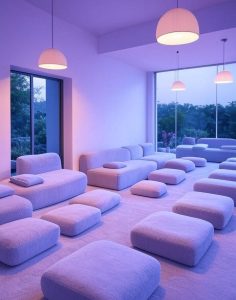 South Korea’s wellness scene thrives on innovation, blending tradition with modern flair. From jjimjilbangs to sleek urban spas, the country’s approach to self-care captivates both locals and global audiences. Korean news outlets, from “The Korea Herald” to “Yonhap News Agency”, frequently spotlight wellness trends, amplifying their cultural reach. These platforms don’t just report; they shape public perception, turning niche services into mainstream desires. As wellness becomes a lifestyle staple, a new player has emerged: office sites, or OPs, which are redefining how South Koreans access relaxation and entertainment.
South Korea’s wellness scene thrives on innovation, blending tradition with modern flair. From jjimjilbangs to sleek urban spas, the country’s approach to self-care captivates both locals and global audiences. Korean news outlets, from “The Korea Herald” to “Yonhap News Agency”, frequently spotlight wellness trends, amplifying their cultural reach. These platforms don’t just report; they shape public perception, turning niche services into mainstream desires. As wellness becomes a lifestyle staple, a new player has emerged: office sites, or OPs, which are redefining how South Koreans access relaxation and entertainment.
Office sites, known as 오피사이트 in Korean, have become a cornerstone of the wellness industry. These platforms, like OPCMD, curate verified information about professional businesses offering massage, skincare, and spa treatments in intimate, customer-focused settings. Beyond traditional wellness, they also list entertainment venues such as room salons, karaoke bars, shirt rooms, and pool salons. By providing transparent details like pricing, reviews, and service quality, these sites empower consumers to make informed choices. News outlets like “Maeil Business Pulse” often highlight how such platforms drive consumer trust, reflecting a broader shift toward openness in service industries.
The Media’s Role in Wellness Trends
Korean media doesn’t just follow trends; it creates them. Outlets like “KED Global” and “The Korea Times” regularly feature stories on wellness innovations, from eco-friendly skincare to high-tech spa experiences. These reports often emphasize how platforms like office sites provide reliable access to services, shaping consumer behavior. For instance, a 2023 “Korea Press Foundation” report noted a decline in traditional news consumption, with younger generations turning to digital platforms like YouTube and Naver for updates. This shift has given office sites a unique edge, as they align with the digital habits of millennials and Gen Z, who prioritize convenience and transparency.
Why do office sites resonate so deeply? They tap into South Korea’s fast-paced culture, where busy professionals crave quick, high-quality escapes. A salaryman in Seoul might browse an OP site during a lunch break, booking a massage to unwind after a long day. These platforms offer curated listings, ensuring venues meet high standards for cleanliness and service. “It’s like having a trusted friend recommend a spa,” says Ji-soo, a 29-year-old marketer from Busan. “I don’t have time to guess what’s good, so I rely on verified reviews.” This trust factor, amplified by media coverage, has made office sites a go-to resource.
Transparency and Consumer Empowerment
Transparency is the heartbeat of South Korea’s wellness evolution. Office sites stand out by offering detailed insights into services, from pricing to customer feedback. Unlike traditional advertising, which can feel opaque, these platforms prioritize clarity. “Business Korea” recently reported on the rise of consumer-driven platforms, noting their role in fostering trust in industries like wellness and entertainment. By verifying OP information, sites like opcmd.com ensure users know exactly what to expect, whether it’s a soothing jjimjilbang visit or a lively karaoke night. This openness resonates with a society increasingly skeptical of unverified claims.
Consumers aren’t just passive recipients; they’re active participants. Social media platforms like Instagram and TikTok amplify this trend, with influencers showcasing spa routines or karaoke outings discovered through OP sites. Short-form videos, as noted in a “Punch Digital Marketing” report, have become a powerful tool for promoting wellness experiences, blending aesthetics with authenticity. These platforms don’t just sell services; they create narratives that invite users to imagine themselves in these spaces. When a beauty influencer shares a glowing review of a skincare treatment found via an office site, it sparks curiosity and trust among followers.
READ ALSO: From KTV to Viral: How Public Karaoke Videos Dominate Social Media
The Global Ripple Effect
South Korea’s wellness trends don’t stay local; they ripple globally. The “Korea Herald” reported on the global fascination with jjimjilbangs, with cities like New York and London adopting Korean-style spas. Office sites play a subtle but crucial role here, providing a blueprint for curated, transparent service listings that other countries are beginning to emulate. “Korean wellness is a lifestyle, not just a service,” says Hye-jin, a spa owner in Seoul. “Platforms like these make it easy for anyone, anywhere, to understand what we offer.” This global appeal, fueled by media buzz, underscores South Korea’s soft power in shaping wellness culture.
What’s next for office sites? As South Korea’s media landscape evolves, these platforms will likely grow even more influential. With 92.7% of South Koreans using the internet daily, digital platforms are the future of consumer engagement. The rise of AI and data-driven recommendations could further enhance OP sites, offering personalized wellness suggestions. Meanwhile, Korean news outlets will continue to spotlight these platforms, weaving them into the narrative of a nation that values health, transparency, and innovation. For now, office sites remain a quiet force, guiding South Koreans, and the world, toward a more connected, wellness-focused future.
